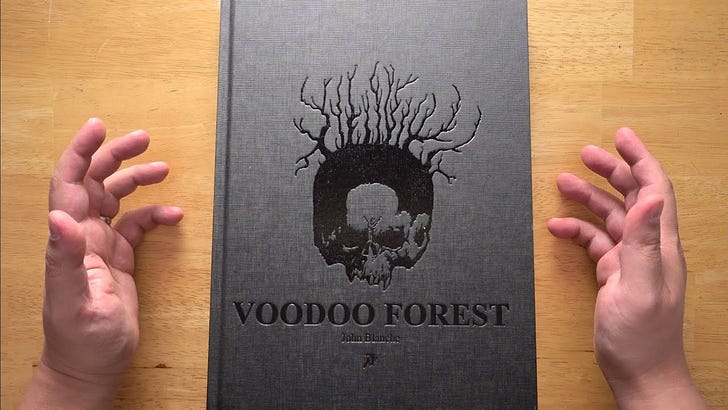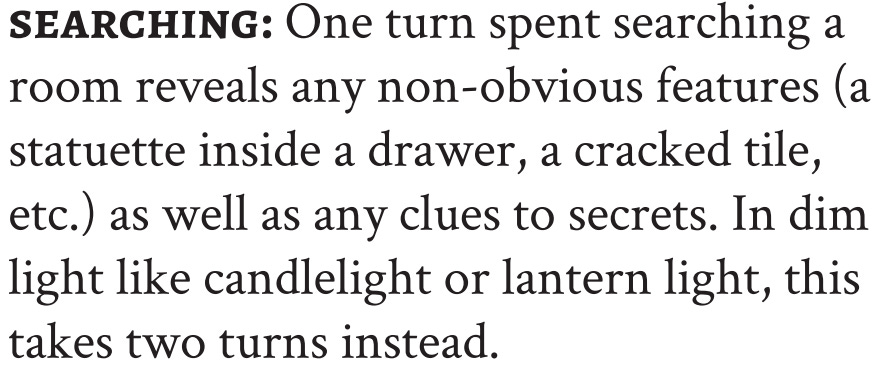This week I took a look at John Blanche’s new grimdark universe Voodoo Forest.
The secret newsletter-only sale for Summer’s End continues. Drop a dungeon or an adventure hex into your campaign at a moment’s notice!
When you try to do something difficult in an RPG, it’s almost always decided by a dice roll. Which is a little weird, right? When I try to accomplish something in the real world, random chance might be a bit of a factor, but the vast majority of my success is driven by three things:
Training
Time
Effort
If you have the right training, and you put in enough time and effort, you can do almost anything (or so my parents told me). When task resolution is mostly luck driven, it makes the game feel like it’s out of your hands. You aren’t deciding whether you succeed, the dice are, and as someone who wants to prioritize player agency, that’s no good. One of my highest priorities is getting players to directly engage with the game world and make impactful choices in it, and rolling dice skips past that.
So, how can we shift things back into the players’ control?
Training
Consider the PC’s training, background, and relevant skills before deciding that you need to roll the dice. Exactly how high their skill has to be will probably depend on the roll window you’re using. I use a narrow window, so I’m pretty generous. Ask yourself:
What would the PC’s class or background be inherently good at?
What skills do they have proficiency in?
If someone is trained as a thief and tries to sneak up on a sleeping guard, it should automatically work. For a wizard, they have to roll. If someone with a blacksmith background wants to forge a normal dagger and they have their tools, no roll is necessary. But for someone without that background, it could be very difficult or simply impossible.
When a player in my game wants to make a lore or knowledge check, I use this rule from Knave 2e.
The goal here is to make the choice of background/career/class very impactful. It feels great to just know things that are in your purview. And when you don’t know it, you get pushed out on an adventure to find it. Either way, it’s good for the game.
If players lack the training to get something done, remind them that there are experts for every skill imaginable somewhere in your game world. Seeking out and recruiting the right expert can make any obstacle trivial. It also makes the world feel richer and mirrors how a lot of fantasy stories work.
Time
A huge number of rolls can be skipped by asking one question: “How long do you spend?” In many cases, the task might be difficult, but trying over and over would get it done. And when there is no time pressure to make that relevant, what are you rolling for?
This is especially the case when it comes to searching areas for information or loot. Again, from Knave 2e:
Whether you find hidden things or not is no longer random chance, it’s a choice. Will you spend the time and risk a random encounter? Will you use a torch to speed up the search (even through they burn out quickly)? In essence you’re placing a wager, balancing risk and reward. The same thing goes for detecting traps, where you automatically find them as long as you are moving extremely slowly. You can speed up a delve, but at the heavy cost of knowledge.
You can also create dilemmas by saying things like, “You can roll to see if you can break down the door, but then I’ll roll to see if someone hears you. Or, you can just take as long as you need to break it down, but someone will definitely hear.” This gives them the option to forgo the RNG and make the outcome certain, as long as they pay the price.
The “Taking 10” and “Taking 20” rules from 3e are also very good if you want to go down a more mechanically defined path.
Effort
Spending effort in an RPG can be framed as “What are you willing to sacrifice?” This could be time as mentioned above, but it can also be something more concrete, like:
Hit Points: Want to leap over this chasm? You can risk your life with a roll, or spend HP exerting yourself until the task is easy enough to be automatic. Want to fight a room full of basic mooks? Bypass them by spending 1 HP per guy killed.
Magic: Dungeon Crawl Classics does something similar with its magic system, where you can burn ability points to force the random spell effects to be more powerful. In DnD, you could spend spell slots (or fill them, depending on your framework) to accomplish basic magical tasks like detecting magic or counter-spelling. This is even simpler if your game uses a mana points system.
Breakage: Allow players to succeed if they lose or break an item. Bypass this lock, but lose your lock pick. Fish the magic gem out of the pool of lava, but whatever tool you use is ruined. Slay the demon king with any magic weapon, but it will be destroyed in the process. Knave 2e builds this into its combat system.
Wealth: Money can grease a lot of wheels, especially in social situations, or maybe you need to spend enough money to buy the right item for the job. Consider creating standard bribe amounts that will get you favors from NPCs. In Knave 2e this is based on their monthly cost of living.
Manpower: When in doubt, throw more people at the problem. This also provides a way to offer players a dilemma when they’ve become attached to a hireling. “If you send the hireling ahead of you, you’ll always know where the traps are, but he will bear the brunt of it.”
What are dice for?
A lot of players like rolling the dice, and I’m not here to tell them not to enjoy that. But as a GM and game designer, what I want more than anything in a game are impactful decisions. I want the game to be full of choices that affect the game’s outcome, where a player can point to the result and say “That happened because of me, not the dice.”
Some GMs like rolling the dice because it’s a fast and easy way to make something hard by making it unlikely. But you can just as easily make something hard by requiring a lot of expertise or a heavy sacrifice of time and resources. Provide paths to success for players who engage with the game world rather those who just hope to roll well.
Whenever you can, look for ways to resolve PC tasks with decision-making rather than luck. Reserve the dice for tasks where chance is a significant, unavoidable factor.









I really like this article. I have seen variations of the ideas in other places. But I like what you are pulling together, and your focus on the player as deciding their character’s future.
Appreciate the work you do sharing good design and player focused gaming with so many people.
I learned a lot about OSR from your channel on YouTube. I am a grognard, so OS without the R. It’s been great learning about more recent design ideas.
I’ve also learned a bunch from story gaming. Good stuff all around. Keep informing and delighting us!
From an Old Role and Roll player.
I ask my players a lot of “How?”. It gets them more into problem-solving, gives them more agency, and will way less dice.
Good text!